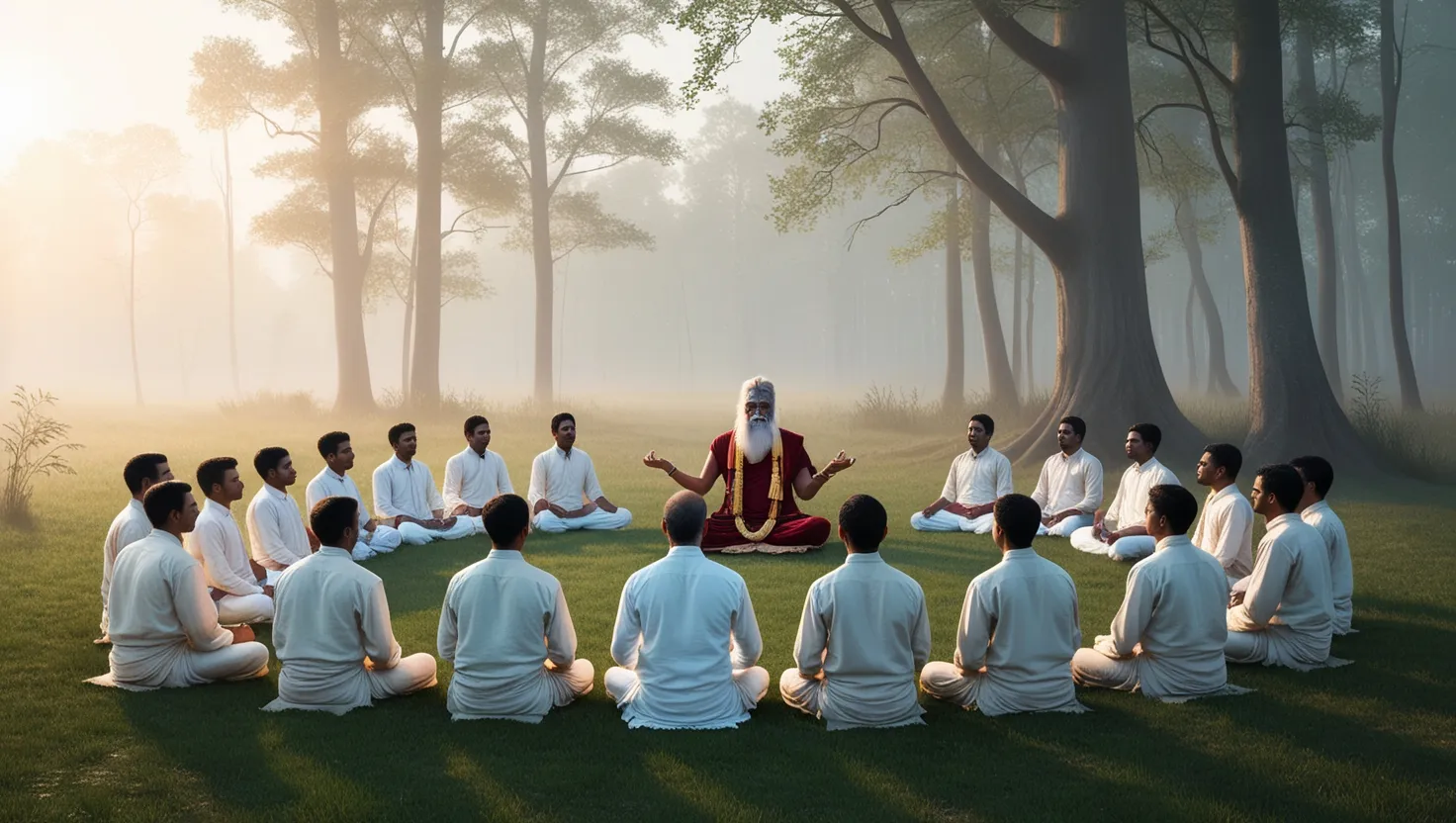The Mahabharata: Timeless Wisdom for Modern Living
The Mahabharata, an ancient Indian epic, isn’t just a tale of gods and heroes. It’s a treasure trove of life lessons that are surprisingly relevant in our fast-paced, modern world. Let’s dive into some of these pearls of wisdom and see how they can shape our lives for the better.
Never Stop Learning
Remember when you were a kid, always asking “why” and soaking up new information like a sponge? Well, the Mahabharata tells us we should keep that curiosity alive throughout our lives. Take Arjuna, for example. This guy was already a legendary warrior, but he never stopped trying to improve himself. He learned from teachers, gods, and even his charioteer (who happened to be a god in disguise). It’s a reminder that no matter how good we think we are at something, there’s always room to grow.
Think about it - in today’s world, things are changing faster than ever. If we’re not constantly learning and adapting, we’re falling behind. So, pick up a new skill, read a book on an unfamiliar topic, or learn from the people around you. You never know when that knowledge might come in handy.
Half-Baked Knowledge Can Be Dangerous
Here’s a sobering thought from the epic - knowing just enough to be dangerous is, well, dangerous. The story of Abhimanyu is a perfect example. This young warrior knew how to enter a complex battle formation but didn’t know how to get out. Spoiler alert: it didn’t end well for him.
In our information-saturated world, it’s easy to think we know everything after a quick Google search or watching a YouTube video. But real expertise takes time and effort. So, before you start giving medical advice based on WebMD or try to rewire your house after watching a DIY video, remember Abhimanyu. Take the time to gain comprehensive knowledge, especially when the stakes are high.
True Friendship is Priceless
In a world where we can have hundreds of “friends” on social media, the Mahabharata reminds us of the value of true friendship. The bond between Krishna and Arjuna is legendary. Krishna stood by Arjuna through thick and thin, offering guidance, support, and even divine intervention when needed.
This doesn’t mean you need a god as your bestie, but it does highlight the importance of cultivating deep, meaningful friendships. These are the people who’ll celebrate your victories, comfort you in your defeats, and tell you when you’re being an idiot (because sometimes we all need to hear that). Quality over quantity, folks.
Revenge is a Dish Best Not Served at All
We’ve all felt the urge for revenge at some point. Someone cuts you off in traffic, and you fantasize about their car breaking down. Your coworker takes credit for your work, and you dream of exposing them in front of the whole office. The Mahabharata says: don’t do it.
The epic is full of characters seeking revenge, and it never ends well. Take Shakuni, who spent his whole life plotting revenge against the Pandavas. His actions set off a chain of events that led to a devastating war. The lesson? Holding onto grudges and seeking revenge only leads to more pain and suffering. It’s like drinking poison and expecting the other person to die. Let it go, move on, and use that energy for something positive instead.
Plan, Unite, Conquer
If there’s one thing the Pandavas teach us, it’s the power of having a solid plan and sticking together. These brothers faced exile, attempts on their lives, and a massive war, but they came out on top because they had a strategy and worked as a team.
In our personal and professional lives, this lesson is gold. Got a big project at work? Make a plan and get your team on board. Trying to achieve a personal goal? Break it down into steps and rally your support system. Remember, you don’t have to face life’s challenges alone.
Check Your Ego at the Door
Ego - we all have it, but the Mahabharata warns us about letting it run wild. Just look at Duryodhana. His massive ego and greed led him to make one bad decision after another, ultimately resulting in his downfall.
It’s a reminder to stay humble and check our egos. Sure, it feels good to be right or to win, but at what cost? Sometimes, admitting we’re wrong or letting someone else take the spotlight can lead to better outcomes in the long run. Plus, it makes you a lot more pleasant to be around.
Words Have Power
In today’s world of instant communication, the Mahabharata’s lesson on the power of words is more relevant than ever. Remember how Draupadi’s harsh words to Duryodhana led to her humiliation? It’s a stark reminder that our words can have far-reaching consequences.
Before you fire off that angry tweet or leave a scathing comment, take a breath. Ask yourself: Is this necessary? Is it kind? Could it come back to bite me? Sometimes, silence is the best response. And when you do speak, choose your words carefully. They have the power to heal or hurt, to build up or tear down.
Stand Up for What’s Right
Arjuna’s dilemma before the great war is a classic example of moral conflict. He was torn between his duty as a warrior and his love for his family. Krishna’s advice to him? Do what’s right, even when it’s hard.
In our lives, we often face similar dilemmas. Maybe it’s speaking up against a popular but harmful idea at work, or standing up for someone being bullied. It’s not always easy to do the right thing, especially when it goes against the grain. But integrity and a clear conscience are worth more than temporary comfort or popularity.
Never Give Up
Karna’s life story is like a masterclass in perseverance. This guy faced discrimination, rejection, and hardship at every turn, but he never gave up. He kept pushing forward, staying true to his principles and working towards his goals.
Life can be tough sometimes. We face setbacks, failures, and moments when giving up seems like the easiest option. But Karna’s story reminds us that persistence pays off. Keep going, keep trying, keep believing in yourself. Your breakthrough might be just around the corner.
Women are Strong
Let’s talk about Draupadi for a moment. This woman went through hell - she was humiliated, violated, and treated as a possession. But did she crumble? Nope. She stood up for herself, demanded justice, and played a crucial role in shaping the events of the epic.
In a world that still struggles with gender equality, Draupadi’s story is a powerful reminder of women’s strength and resilience. It tells us that women aren’t just side characters in someone else’s story - they’re powerful forces in their own right, capable of changing the course of history.
So there you have it - life lessons from an ancient epic that are still kicking ass in the 21st century. The Mahabharata teaches us to keep learning, seek complete knowledge, value true friendships, let go of revenge, plan and unite, check our egos, choose our words carefully, stand up for what’s right, never give up, and recognize the strength of women.
These aren’t just dusty old teachings - they’re practical, powerful tools for navigating our complex modern world. Whether you’re dealing with workplace drama, personal relationships, or your own personal growth, there’s something in this epic for you.
The beauty of these lessons is their universality. You don’t need to be a warrior prince or a divine being to apply them. They work just as well for a software developer in Silicon Valley as they do for a teacher in Tokyo or a farmer in France.
So, the next time you’re faced with a difficult decision or a challenging situation, why not take a page out of the Mahabharata’s book? You might just find that this ancient wisdom has some very modern solutions.
Remember, life isn’t about avoiding challenges - it’s about facing them with wisdom, integrity, and resilience. And if a bunch of guys from thousands of years ago could figure this stuff out, surely we can too, right?
So, go forth and conquer your own epic battles, armed with the wisdom of the ages. Just try to avoid starting any actual wars in the process. That’s one part of the Mahabharata we definitely don’t need to recreate.






